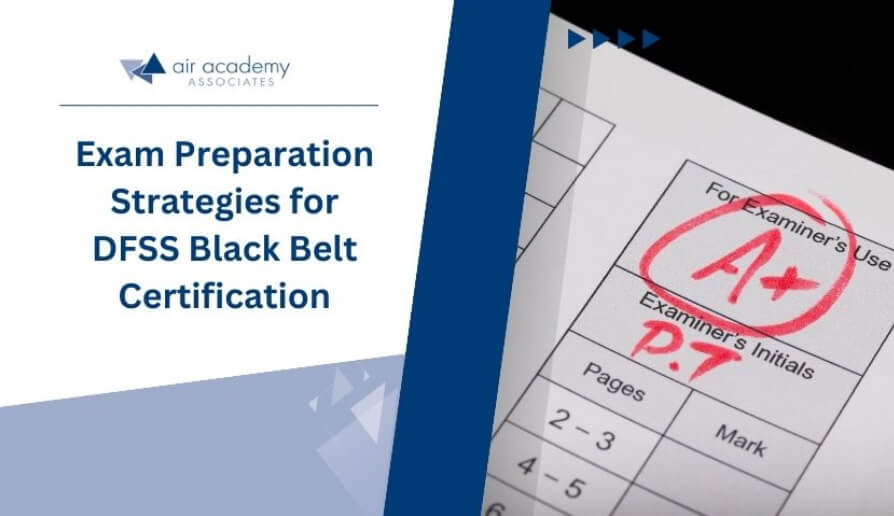
Design for Six Sigma (DFSS) Black Belt Certification is a highly esteemed qualification sought by professionals aspiring to master process improvement methodologies. The exam is known for its rigor, but candidates can approach it with the right strategies and preparation with confidence and a higher probability of success.
Key Takeaways
- A deep understanding of the exam’s structure and content areas, such as critical methodologies, tools, and core concepts, is crucial for adequate preparation and success.
- Customizing your study plan to fit your learning style, utilizing various study materials, and engaging in practical application exercises can significantly enhance your mastery of DFSS principles.
- Participation in study groups and practice with mock exams are invaluable for reinforcing knowledge, identifying weak areas, and building confidence ahead of the exam.
- Maintaining a healthy lifestyle, staying motivated, and seeking guidance from certified professionals are essential strategies for managing stress and ensuring a focused and efficient preparation process.
How to Ace the DFSS Black Belt Certification

Image Source: Freepik
Below are some actionable and comprehensive strategies to aid prospective candidates in preparing for the DFSS Black Belt Certification Exams.
1. Understand the Exam Structure
Before embarking on your study journey, it is imperative to understand the structure of the exam thoroughly. Familiarize yourself with the number of questions, the types of questions, the marking scheme, and the exam duration. This means going beyond the number of questions, types of questions, marking scheme, and exam duration. To effectively allocate your study time and approach the exam with confidence, you must dive deeper into the specific content areas that are frequently tested.
a. Key Methodologies
The DFSS Black Belt Certification emphasizes various methodologies foundational to Six Sigma and quality management. These include but are not limited to, the DMADV (Define, Measure, Analyze, Design, Verify) framework, which is pivotal for new product or process design. Understanding how to apply these methodologies in different scenarios is crucial, as exam questions often test your ability to adapt and apply them to theoretical and real-world problems.
b. Critical Tools
Familiarize yourself with the tools and techniques essential to DFSS, such as Quality Function Deployment (QFD), Failure Modes and Effects Analysis (FMEA), and Design of Experiments (DOE). These tools are not just names to be memorized; you must understand their application, benefits, and limitations. The exam will test your ability to use these tools effectively to solve problems and make data-driven decisions.
c. Core Concepts
Deepen your knowledge of core DFSS concepts, including but not limited to statistical analysis, process capability analysis, and risk management. These concepts are the backbone of DFSS, enabling professionals to design processes that meet customer needs and organizational goals with minimal defects.
d. Practical Application
The DFSS Black Belt Certification Exam also tests your ability to apply theoretical knowledge in practical scenarios. This includes interpreting data, making decisions based on statistical analysis, and proposing improvements based on DFSS principles. Be prepared to encounter questions requiring you to think critically about applying DFSS tools and methodologies in a given situation.
2. Create a Study Plan
A personalized study plan tailored to your learning style is pivotal for earning the DFSS Black Belt Certification. Break down the syllabus into manageable segments, dedicating specific time to each, ensuring a thorough understanding of all topics. Here’s how to adapt your plan based on different learning preferences:
- Visual Learners: Incorporate diagrams, flowcharts, and mind maps into your notes. Utilize online resources that offer video tutorials and visual representations of complex concepts to aid comprehension and memory retention.
- Auditory Learners: Engage with audio recordings of lectures, participate in discussion forums, or explain concepts aloud to a study partner. Audio resources and podcasts that delve into DFSS methodologies can be particularly beneficial.
- Kinesthetic Learners: Apply concepts through hands-on projects or simulations. Create physical models or use software tools to simulate DFSS processes. Engaging in active problem-solving or teaching concepts to others can also reinforce learning.
Each study session should be balanced with short breaks to prevent burnout and include revision periods and mock exams to consolidate knowledge and practice exam techniques. Tailoring your study approach to fit your learning style not only enhances the efficiency of your preparation but also makes the learning process more engaging and effective.
3. Use Reliable Study Materials
The foundation of adequate exam preparation lies in using suitable study materials. Choose current and relevant resources for the DFSS Black Belt Certification. Incorporate materials, including textbooks, peer-reviewed articles, online tutorials, and simulated exams. This mix will broaden your understanding and provide insights into the practical application of DFSS principles.
4. Join a Study Group

Image Source: Pexels
Study groups can offer invaluable support, diverse perspectives, and a wealth of resources. These groups enable you to engage in deep discussions, exchange valuable insights, and collaboratively approach complex problems. This dynamic form of study diversifies your understanding and introduces new perspectives on the DFSS methodology.
5. Practice with Mock Exams
Early identification of weak areas is key to focused improvement. Dedicate additional time and resources to these topics, seeking explanations from mentors or study groups to solidify your understanding. Proactively addressing weaknesses minimizes stress as the exam date nears.
6. Focus on Weak Areas
Early identification of your weak areas allows for targeted study. Allocate more time and resources to these areas and seek clarification from mentors or peers to reinforce your understanding. Addressing these weak points early reduces stress as the exam approaches.
7. Maintain a Healthy Lifestyle
A balanced lifestyle is crucial during exam preparation. Regular exercise, a nutritious diet, and adequate sleep contribute to optimal cognitive function, stress reduction, and improved concentration and memory. Avoiding overreliance on stimulants like caffeine can also aid in maintaining stable energy levels.
8. Stay Positive and Motivated
Maintaining a positive mindset is essential. Set achievable goals, celebrate your progress, and stay motivated. Avoid negative thoughts and focus on your progress and the knowledge you are gaining. Visualization techniques can also help maintain motivation and reduce anxiety.
9. Seek Guidance from Certified Professionals
Networking with professionals who have successfully obtained the DFSS Black Belt Certification can provide insights into effective study materials, preparation strategies, and exam-taking techniques. Their experiences can offer valuable lessons and motivate you to stay committed to your preparation journey.
10. Review and Revise
Regular and focused revision is crucial for information retention. Create concise summary notes and review them frequently, focusing on key concepts, formulas, and methodologies during your final revision. Utilizing active recall and spaced repetition techniques can also enhance memory retention.
11. Manage Your Time Effectively

Mastering effective time management techniques is essential to excel in the DFSS Black Belt Certification exam. This involves understanding the material thoroughly and navigating the exam efficiently under time constraints. Here’s how you can prepare:
- Simulate Real Exam Conditions: By practicing under the same time limits as the actual exam, you’ll better understand how to pace yourself. This method helps identify the types of questions that take the longest to answer, allowing you to devise strategies to address them more efficiently.
The following points offer specific strategies to enhance your time management during the exam:
- Tackle Easier Questions First: Quickly answering questions you are confident about can boost your score and confidence while conserving time for more challenging questions.
- Mark and Move On: If you encounter a time-consuming question, mark it and proceed to the next question. This ensures you’re maximizing the number of questions attempted without getting bogged down.
- Efficient Problem-Solving Strategies: Develop quick methods for dealing with complex questions, such as identifying key terms or employing systematic approaches to eliminate incorrect answers.
- Mindfulness and Stress Management: Techniques like deep breathing or brief meditation before and during the exam can help keep anxiety at bay, allowing for clearer thinking and better time management.
Incorporating these strategies into your preparation routine will prepare you for the content of the DFSS Black Belt Certification exam and equip you with the skills to navigate the exam effectively and efficiently.
12. Stay Calm During the Exam
Maintaining composure during the exam is vital. Read each question carefully, allocate time wisely, and avoid spending too much time on a single question. If unsure about a question, make an educated guess and move on, ensuring you attempt all questions.
Updates in DFSS Black Belt Certification

Image Source: Pexels
Understanding DFSS Methodologies and Levels
The recent updates focus more on Critical Parameter Management (CPM), the Voice of the Customer (VOC) analysis, and the Voice of the Process. This approach is pivotal in minimizing the need for redesign and design rework.
Additionally, the certification now outlines three primary methodologies: DMADV (Design, Measure, Analyze, Develop, & Verify), IDOV (Identify, Design, Optimize, and Validate), and a third specialized approach for the manufacturing sector, each designed to apply DFSS principles effectively.
Curriculum and Certification Enhancements
Updates to the curriculum include a significant addition of advanced statistical and graphical analysis tools, underlining their importance in testing and evaluation processes. There’s also an enhanced focus on the practical application of DFSS methods towards developing new products and services, ensuring the skills acquired through the certification are broadly applicable across various industries.
Certification Process Updates
The certification process has been refined to include a series of online lectures and exercises that provide a comprehensive understanding of DFSS. To achieve certification, candidates are now required to complete these components along with a certification exam, with a specified cumulative score needed for successful completion. This ensures a standardized level of knowledge and expertise among all certified professionals.
Conclusion
The DFSS Black Belt Certification Exam is challenging, but success is attainable with diligent preparation, a structured approach, and a positive mindset. Becoming a DFSS Black Belt is enriching, providing an opportunity to deepen knowledge, enhance skills, and contribute significantly to organizational success.
Approach your preparation with dedication, resilience, and a passion for learning, and you will be well on your way to acing the DFSS Black Belt Certification Exam.
At Air Academy Associates, we are dedicated to providing top-notch training and resources for Design for Six Sigma (DFSS) Black Belt Certification. Our expertly designed courses and comprehensive materials are your gateway to mastering process improvement methodologies and achieving professional excellence.


